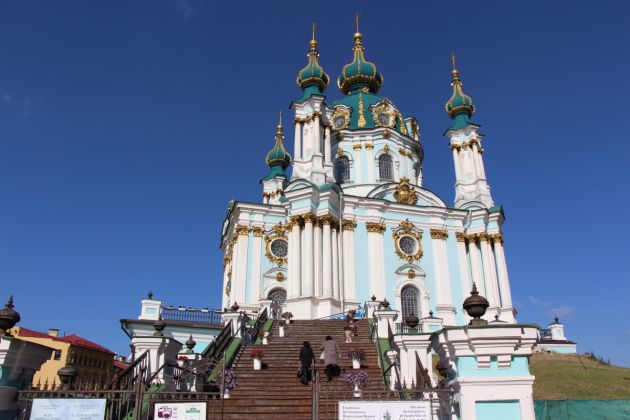World churches body urges 'caution' from Ukraine with new law targeting pro-Russian religious groups

Two World Council of Churches leaders are urging Ukraine to act with 'caution' regarding a law passed by the country's Rada, the parliament, that has banned the activities of religious organizations associated with Russia in Ukraine.
WCC general secretary Rev. Jerry Pillay and WCC moderator Bishop Heinrich Bedford-Strohm are in a joint statement urging caution about the law passed by the Rada.
Ukrainian leaders have accused the Moscow-linked Ukrainian Orthodox Church of supporting Russia's 30-month-old war on Ukraine by spreading pro-Russian propaganda and housing spies.
In the Rada, 265 lawmakers passed the bill, and it banned the Russian Orthodox Church from Ukrainian territory, Reuters news agency reported.
The law says a government commission will compile a list of "affiliated" organizations whose activities are unacceptable.
Ukrainian lawmakers on Aug. 20 passed the law envisaging a ban on the activities of the Russia-linked branch of the Orthodox church.
Kyiv has accused the church of complicity in Moscow's invasion of Ukraine, Reuters reported.
"The government of Ukraine has the sovereign right and responsibility to defend the nation's territorial integrity and to protect its citizens, even more so in the face of Russia's illegal invasion and armed aggression," said Pillay and Bedford-Strohm.
The WCC has consistently condemned Russia's war against Ukraine, and "we remain steadfast in that position," they said.
"Ukrainian authorities have a right to protect Ukraine's sovereignty and independence and to prosecute individuals guilty of crimes against the interests of Ukraine."
Still, they said, "The WCC is deeply alarmed by the potential for unjustified collective punishment of an entire religious community and violation of the principles of freedom of religion or belief under a new law approved by the Ukrainian Rada on 20 August 2024."
The new law needs the signature of President Zelensky to be ratified into law.
"We call again on the Ukrainian government to exercise caution in relation to measures that risk violating the fundamental right to freedom of religion or belief and undermining social cohesion at this time of national emergency," said Pillay and Bedford-Strohm.
"We note the six-step process prescribed by the new law before a religious organization can be banned and plead that there be a fair and unbiased approach to any such investigation and that due consideration be given to the principles of international law, natural justice, and due process in undertaking any actions under this new law."
The WCC leaders said, "Neither the crimes of some individuals nor the historical affiliations of a particular religious entity can be a sufficient basis for measures tantamount to collective punishment of a living worshipping religious community in Ukraine.
"The government of Ukraine is responsible for protecting the rights of all its citizens."
Ukrainian officials have accused the church of aiding in influence operations and espionage during the country's war with Russia, according to Reuters.
The schism between the two Russian-backing churches and the pro-Ukrainian one has been accentuated during the war launched by Russia with its military invasion on Feb. 24, 2022, escalating theRusso-Ukrainian War.
Orthodox Christianity is the most prevalent religion in Russia and Ukraine, and until the Soviet Union's breakup, both belonged to the same hierarchy under the patriarch in Moscow.
The Orthodox Church of Ukraine broke from the Russian church more than 30 years ago and answers to a prelate in Kyiv, but many parishes in Ukraine opted to remain aligned with the Russian church.
The Russian Orthodox Church is the single church with the highest numerical representation in the WCC.
